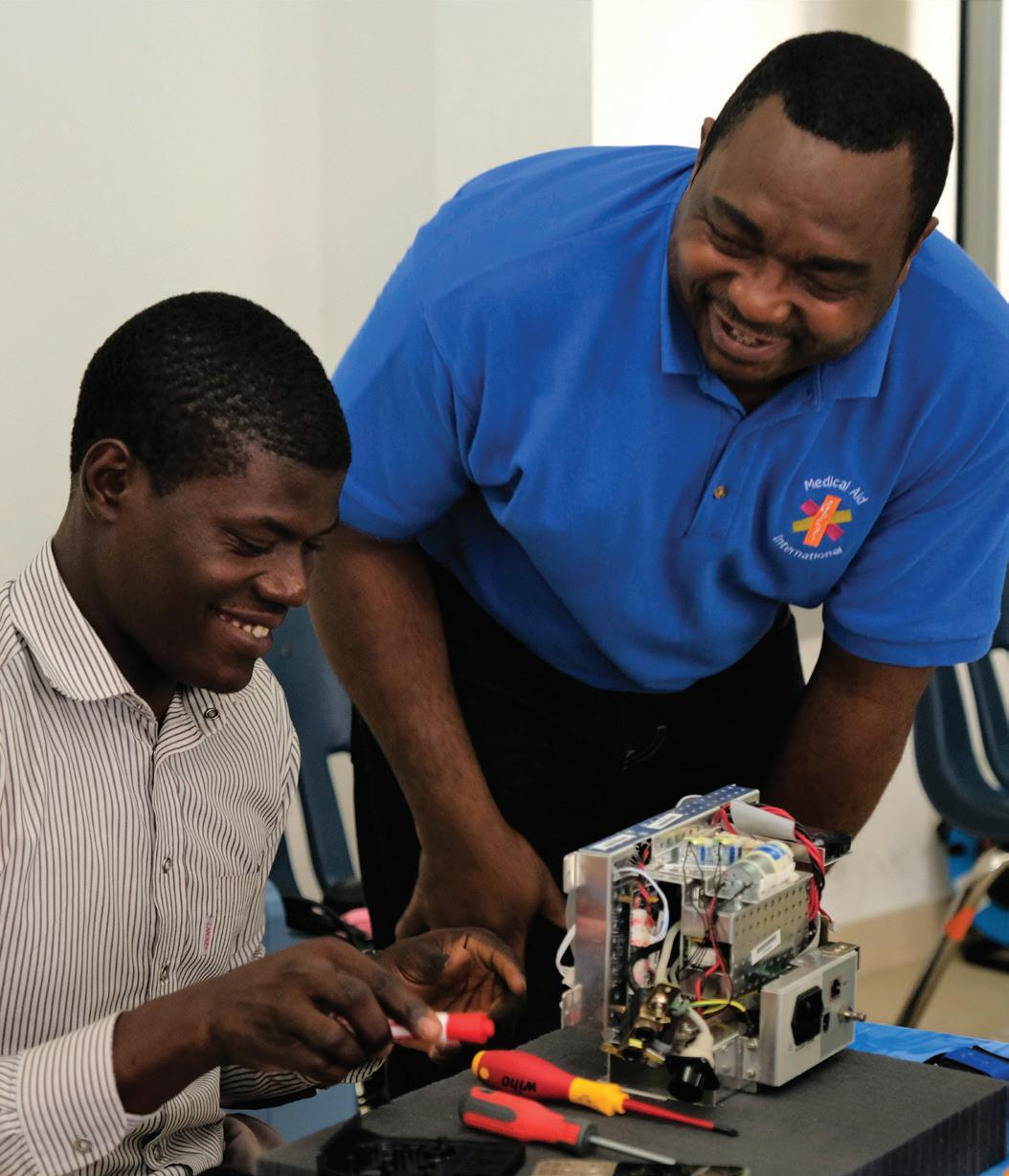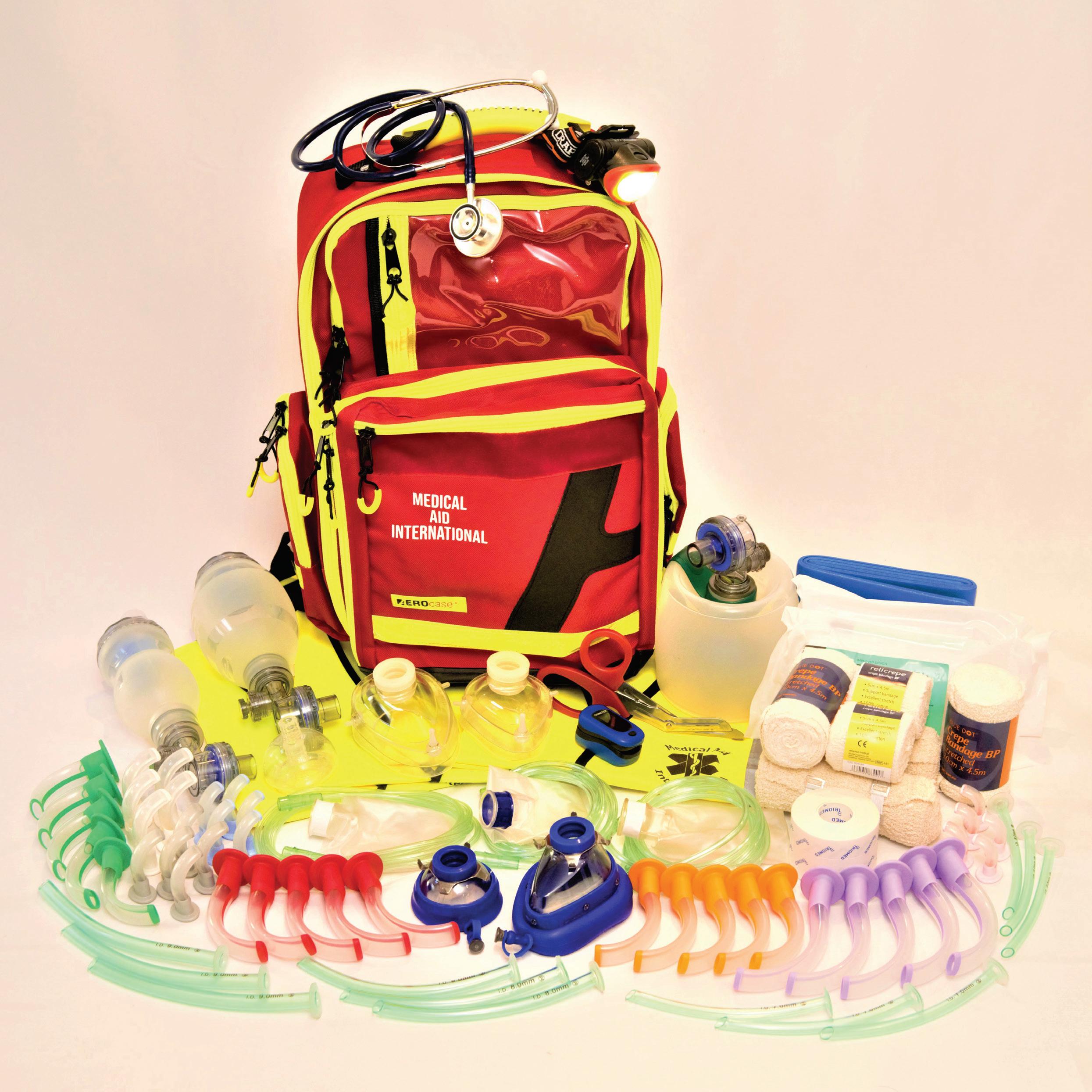
4 minute read
Introducing MedAid Academy
INTRODUCING
It is at the very core of Medical Aid International’s ethical DNA that we should help educate the people we have the privilege of working alongside. When we are in-country, there is obviously ample opportunity for us to share knowledge, but sadly, the reality outside of this is that in the environments in which we work on a day-to-day basis, physical access to relevant and regularly updated education is often lacking – despite people’s very evident passion to learn. To address this challenge, we are proud to have launched MedAid Academy (www. medaidacademy.co.uk), which makes use of the internet, smart phones, tablets and computers to deliver vital training and education. The Academy’s City & Guilds-assured online Biomedical Engineering Training Programme (see main text) is cost-effective, flexible to fit with participants’ existing work schedules, requires no travel or physical contact, and is accessible from any internet connection anywhere in the world. With orthopaedics education available and other educational material resources also in development, the Academy is a force for positive change in environments that always show great willingness to learn, but often simply cannot fund the materials and tools required. And in addition to our own educational programmes, we are proud to support those of our partners, such as the Primary Trauma Care Foundation and the STAE course (Surgical Trauma for Austere Environments), as well as to teach and assess on degree and Master’s courses.
Advertisement
Online Biomedical Engineering Training Programme
Worldwide access to world-changing skills
For many years, we have been training biomedical engineers in-country, through residential training courses. This programme had become vital in enabling healthcare institutions in LMICs to keep their equipment functioning better and more safely for longer – which, in turn, positively impacts clinical outcomes. But these courses were not only relatively expensive, and therefore only accessible to a minority – they also became unworkable in the light of Covid-related restrictions on travel and social contact. This was a source of great concern to us, as so often in our work, we have met ill-equipped but nonetheless motivated hospital maintenance staff and engineers who had sufficient abilities to make a real difference on a sustained basis if only they were equipped with tools and some basic training. The Medical Aid International online Biomedical Engineering Programme was our response to this. It provides global, web-based access to effective biomedical engineering training, foundational knowledge, and support, with no travel or face-toface tuition required, in a holistic package that can be used on its own or as part of a wider support strategy. The programme also includes a comprehensive professional engineering toolkit, textbooks, a full electronic library of service manuals, and optional laptop in ruggedised military specification briefcase. Reporting tools enable sponsors and team leaders to track their students’ progress, and students who complete the course receive a City & Guilds Assured certificate – a globally recognised awarding body – that is also evidence of the high quality of the course content.

Adding Value to Other Suppliers’ Solutions
In addition to producing our own medical equipment, we have also put our many years’ experience of working in LMIC environments to good use to identify the best of other suppliers’ solutions, and to adapt and combine them to produce easy to use, robust, cost-efficient responses suited to LMICs’ most urgent, basic clinical needs. We pride ourselves on our relationships with industry, as this is an integral part of our work. Below are just a few examples of these solutions.
Emergency Bag
Portable first response for patients of all ages
The difficult conditions in LMIC environments both increase the likelihood of clinical incidents and render effective responses to them more difficult. From a newborn child who is not breathing, to an adult injured in an accident, effective first response is critical to a positive outcome – but many LMIC healthcare facilities typically don’t have a complete range of first responder equipment, and certainly not in portable form. The Medical Aid Emergency bag assembles the critical equipment needed to respond to patients of all ages with regard to airway, breathing, circulation, and bone and soft tissue injuries. In addition, it includes a headtorch, high-visibility vests, and gloves, so that responders can clearly see what they are doing, protect themselves and the patient, and remain visible. Its full complement of equipment also includes, amongst other items, a resuscitator with masks suitable for adult, child and neonate, pulse oximeter, airways, scissors, stethoscope, and dressings and bandages. The Emergency Bag is composed entirely of manual and battery-operated equipment, has no reliance on mains electricity, is robust enough for journeys through harsh terrain, and is light enough to be carried on foot or bicycle. It is truly a solution designed specifically for the realities of LMIC environments.









